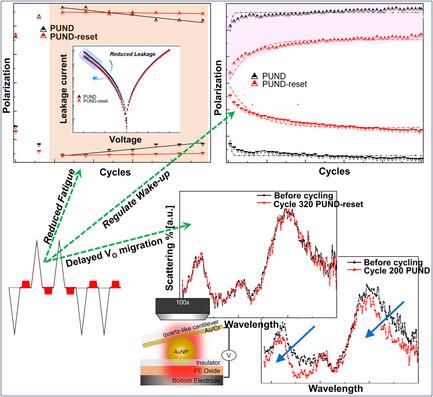Resetting the Drift of Oxygen Vacancies in Ultrathin HZO Ferroelectric Memories by Electrical Pulse Engineering
IF 11.1
Q1 MATERIALS SCIENCE, MULTIDISCIPLINARY
引用次数: 0
Abstract
Ferroelectric HfO2-based films incorporated in nonvolatile memory devices offer a low-energy, high-speed alternative to conventional memory systems. Oxygen vacancies have been rigorously cited in literature to be pivotal in stabilizing the polar noncentrosymmetric phase responsible for ferroelectricity in HfO2-based films. Thus, the ability to regulate and control oxygen vacancy migration in operando in such materials would potentially offer step changing new functionalities, tunable electrical properties, and enhanced device lifespan. Herein, a novel in- operando approach to control both wake-up and fatigue device dynamics is reported. Via clever design of short ad hoc square electrical pulses, both wake-up can be sped up and both fatigue and leakage inside the film can be reduced, key factors for enhancing the performance of memory devices. Using plasmon-enhanced photoluminescence and dark-field spectroscopy (sensitive to <1% vacancy variation), evidence that the electrical pulses give rise to oxygen vacancy redistribution is provided and it is shown that pulse engineering effectively delays wake-up and reduces fatigue characteristics of the HfO2-based films. Comprehensive analysis also includes impedance spectroscopy measurements, which exclude any influence of polarization reversal or domain wall movement in interpretation of results.

通过电脉冲工程重置超薄 HZO 铁电存储器中的氧空位漂移
将基于二氧化铪的铁电薄膜应用于非易失性存储器设备,为传统存储器系统提供了一种低能耗、高速度的替代方案。氧空位在稳定 HfO2 基薄膜铁电性的极性非五次对称相方面起着关键作用,这一点已被文献严格证实。因此,在此类材料中调节和控制氧空位迁移的能力将有可能提供崭新的功能、可调的电学特性和更长的器件寿命。在此,我们报告了一种控制唤醒和疲劳器件动态的新型操作间方法。通过巧妙设计短小的临时方形电脉冲,既能加快唤醒速度,又能减少疲劳和薄膜内部的泄漏,这些都是提高存储器件性能的关键因素。利用等离子体增强光致发光和暗场光谱(对 1%空位变化敏感),提供了电脉冲引起氧空位重新分布的证据,并表明脉冲工程能有效延迟唤醒并降低基于 HfO2 的薄膜的疲劳特性。综合分析还包括阻抗光谱测量,在解释结果时排除了极化反转或畴壁移动的任何影响。
本文章由计算机程序翻译,如有差异,请以英文原文为准。
求助全文
约1分钟内获得全文
求助全文
来源期刊
CiteScore
14.00
自引率
2.40%
发文量
0
期刊介绍:
Small Science is a premium multidisciplinary open access journal dedicated to publishing impactful research from all areas of nanoscience and nanotechnology. It features interdisciplinary original research and focused review articles on relevant topics. The journal covers design, characterization, mechanism, technology, and application of micro-/nanoscale structures and systems in various fields including physics, chemistry, materials science, engineering, environmental science, life science, biology, and medicine. It welcomes innovative interdisciplinary research and its readership includes professionals from academia and industry in fields such as chemistry, physics, materials science, biology, engineering, and environmental and analytical science. Small Science is indexed and abstracted in CAS, DOAJ, Clarivate Analytics, ProQuest Central, Publicly Available Content Database, Science Database, SCOPUS, and Web of Science.

 求助内容:
求助内容: 应助结果提醒方式:
应助结果提醒方式:


